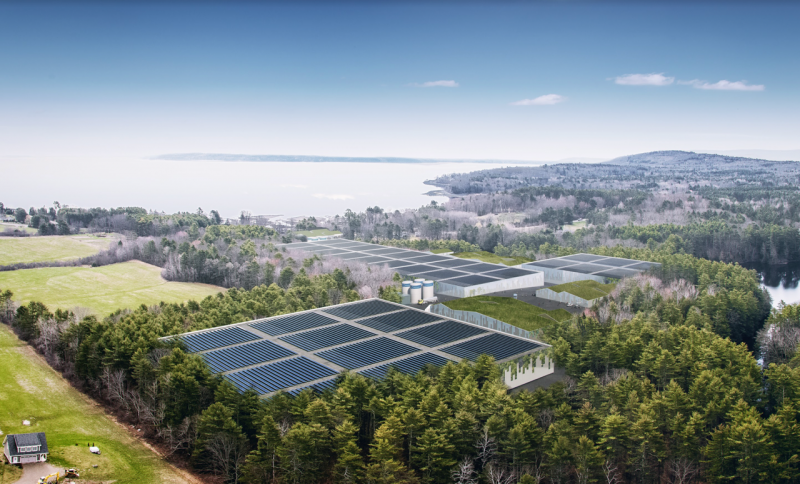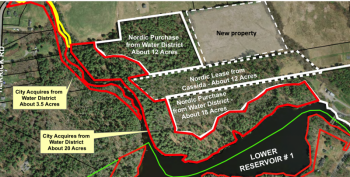In a Sept. 7 newsletter, the Norwegian company that wants to build a large indoor salmon farm in Belfast said it will be filing an application for a Maine Pollution Discharge Elimination System permit in the next month or so. This will be the first permit application that the company has made since announcing last winter that it had chosen Belfast as a possible site for its large scale indoor fish farm.
“In advance of that submission, we will be holding a required public information meeting for the application in Belfast,” said Nordic Aquafarms, in its September newsletter. “We anticipate that the meeting will take place during the last week of September or the first week of October.
“This meeting will be the first of several: one is needed for each of the major applications to the Maine Department of Environmental Protection. As required by DEP regulations, we will send notices to abutters and publish them locally.”
The privately-owned Nordic Aquafarms, Inc., wants to site a land-based indoor salmon farm on 40 acres that currently belongs to the water district and private landowner Sam Cassida. On Aug. 28, the company said it had entered a purchase agreement for more land, which is currently owned by Mathews Bros. That parcel is 14 acres in size and is to be used for buffer, the company said. (See map)
NA said it plans to build the facility in two phases over the next few years.
While it originally planned to route the fish tank discharge pipe through Little River and into Penobscot Bay, where it would run for approximately one mile into the bay, the company said Sept. 7 that it has acquired an easement from a oceanfront landowner across Route 1 and will possibly extend the discharge pipe from its site, to the easement parcel, and then to the bay.
“This option gives us the shortest route to deep water, and underwater surveying shows that other ecological impacts are much lower than the Little River route,” NA said in its newsletter.
“All pipes will be buried below the surface in the intertidal area and will not be visible or noticeable to project neighbors or the community. More information about this will soon be available in our upcoming permit applications at the federal, state, and local levels.”
Nordic Aquafarms said it will update the public with a summary, “of the work done to bring the project to the permitting stage and what permits are required,” at the upcoming meeting.
“We will also provide written data detailing the planned residual discharge numbers, as well as the technologies used to achieve them. The meeting will provide an opportunity for people to ask us questions about the MEPDES licensing process, timeline, and discharge.
“We anticipate that our application will propose discharge of water about a kilometer offshore. Prior to discharge, the way we are treating the water will achieve a new standard for the fish farming industry in terms of the environmental profile per pound of fish produced.”
The company continued to elaborate in its newsletter as to why it is investing in water treatment: “Because we recognize that our oceans are under tremendous pressure and that we have an obligation to be responsible stewards of our ocean resources, in Maine and around the world. Limiting the amounts of nutrients discharged, determining how they are diluted in the ocean and assessing environmental impacts, if any, have all been key priorities for Nordic Aquafarms in planning our facility and preparing this application.”
Nordic Aquafarms said it wants to be “best in class” for its environment practices.
The company has opened an office in downtown Belfast, at 159 High Street, and hired Ed Cotter as project director.
Cotter will oversee engineering, design, and construction for the Belfast facility, as well as other follow-on projects. He was most recently an employee of Gilbane Building Company, working on commercial, institutional, and infrastructure projects.
Cotter received a bachelor’s degree in Ocean Engineering from the University of Rhode Island, and has spent much of his career in design, construction, and oversight of coastal projects throughout southern New England, work that has included permitting, environmental reviews, and site logistics.
NA also hired Cathal Dinneen, of Ireland, as the company’s grow-out manager. He, NA said: “is widely recognized as one of the most experienced RAS farmers in the world, with more than two decades of land-based farming in Canada, Iceland, Ireland and Norway involving a variety of different species. Cathal has undergraduate and masters’ degrees in aquaculture and managed the high profile 'Namgis First Nation Kuterra land-based project in British Columbia, before moving to Norway to be part of Nordic Aquafarms’ ground-breaking facility in Fredrikstad, where he is currently production lead.”
To get on NA’s newsletter distribution list, contact ted@tedomearacommunications.com.
Related stories
Nordic Aquafarms buys more Belfast land for its land-based salmon farm
City of Belfast, Water District, Nordic Aquafarms Inc. respond to lawsuit against them



























